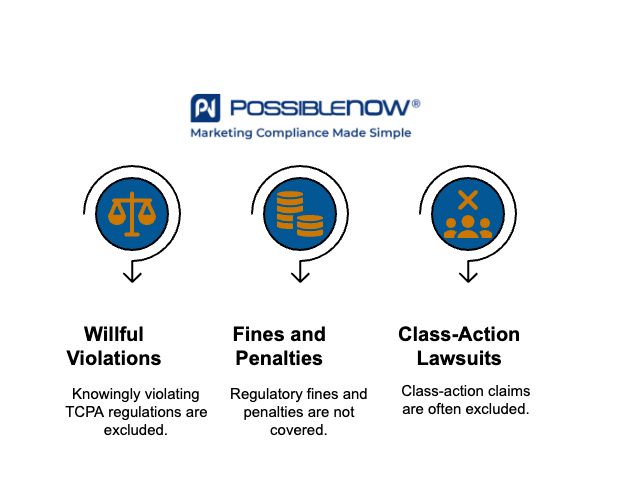Resource Center
Do Insurance Companies Cover TCPA Damages?
Type: Blog
Topic: Do Not Call Solution

The short answer is, not always. While some insurance policies may offer coverage for Telephone Consumer Protection Act (TCPA) violations, it is not guaranteed, and businesses often find themselves facing substantial out-of-pocket costs. General liability and errors and omissions (E&O) insurance typically do not cover TCPA damages. Even when certain policies appear to offer protection, exclusions may apply, leaving companies vulnerable to massive fines, settlements, and legal costs.
Considering the risks associated with TCPA violations, relying solely on insurance is a dangerous strategy. Companies need to be proactive in preventing these violations in the first place, and that’s where PossibleNOW’s Do Not Call platform comes in.
Our DNCSolution helps businesses manage customer communication preferences, stay compliant with TCPA regulations, and mitigate the risk of costly lawsuits and penalties.
Speak With an Expert Today
What Types of Insurance Cover TCPA Damages?
While TCPA violations are considered regulatory infractions, certain insurance policies may provide some level of coverage. These typically include:
- Cyber Liability Insurance: Some cyber liability policies may cover TCPA claims, as they are often categorized under privacy violations. However, this coverage is not universal, and businesses must scrutinize the policy terms to confirm what’s protected.
- Media Liability Insurance: This insurance can sometimes cover claims related to advertising and telemarketing practices, which may include TCPA violations. However, this is not always the case, and exclusions are often common.
- Directors and Officers (D&O) Insurance: In some cases, D&O policies may cover TCPA claims, particularly if the violation is linked to a broader business decision. However, coverage under these policies is often limited and heavily dependent on the specific terms.
Even when a policy includes TCPA coverage, there are often significant limitations and stipulations that reduce the scope of protection. TCPA damages can be severe, and businesses should not assume they will be covered entirely—or at all—by their insurance policies.
Common Exclusions in Insurance Policies for TCPA Claims

Many insurance policies that seem to offer coverage for TCPA violations come with exclusions that limit or eliminate protection. Common exclusions include:
Willful Violations
If a business is found to have knowingly violated TCPA regulations, insurance policies typically do not cover the resulting fines or damages. Intentional actions often fall outside the scope of protection.
Fines and Penalties
Many policies exclude coverage for regulatory fines and penalties, which make up a significant portion of TCPA-related costs. Businesses may find that while certain defense costs are covered, the fines themselves are not.
Class-Action Lawsuits
As TCPA violations frequently lead to class-action lawsuits, the potential financial impact can be enormous. Unfortunately, some insurance policies exclude class-action claims, leaving businesses unprotected against the most costly type of litigation.
Why Relying on Insurance Alone Is Risky for TCPA Compliance
While insurance may offer some relief in the event of a TCPA violation, depending on it alone is risky. Coverage is often incomplete or comes with exclusions that prevent full protection.
Additionally, the reputational damage that comes with a TCPA violation cannot be fixed by an insurance payout. When customers feel their privacy has been violated, the trust that has been built can quickly erode.
Proactive compliance is the key to avoiding these risks altogether. Rather than relying on incomplete insurance policies, companies can take control of their compliance efforts with PossibleNOW’s DNCSolution, preventing costly violations before they happen.
Request a Demo Today
About PossibleNOW
PossibleNOW is the pioneer and leader in customer consent, preference, and regulatory compliance solutions. We leverage our MyPreferences technology, processes, and services to enable relevant, trusted, and compliant customer interactions. Our platform empowers the collection, centralization, and distribution of customer communication consent and preferences across the
enterprise. DNCSolution addresses Do Not Contact regulations such as TCPA, CAN-SPAM and CASL, allowing companies to adhere to DNC requirements, backed by our 100% compliance guarantee.
PossibleNOW’s strategic consultants take a holistic approach, leveraging years of experience when creating strategic roadmaps, planning technology deployments, and designing customer interfaces. PossibleNOW is purpose-built to help large, complex organizations improve customer experiences and loyalty while mitigating compliance risk.
-
TCPA Regulations and Compliance: Complete Guide
Type: Blog
Topic: Do Not Call Solution
-
Defining Meaningful Metrics: 6 Soft KPIs to Measure Customer Preference Collection
Type: Blog
Topic: Preference Mgmt
-
Email Preference Center Best Practices
Type: Blog
Topic: Preference Mgmt
-
The Basics of DNC Scrubbing: What Is a Do Not Call (DNC) Scrubber and Why Do You Need It?
Type: Blog
Topic: Do Not Call Solution
-
What is Consent Management, How it Works, & Why it’s Important for Data Compliance
Type: Blog
Topic: Consent Mgmt
-
Do Insurance Companies Cover TCPA Damages?
Type: Blog
Topic: Do Not Call Solution
-
8 Best Practices for Capturing GDPR Consent
Type: Webinars
-
Data Silos Cause Communication Gaps
Type: Videos
Topic: Preference Mgmt
-
Difference Between Preferences & Consent
Type: Videos
Topic: Preference Mgmt
-
Integrate Do Not Call Compliance with Preferences
Type: Videos
Topic: Preference Mgmt
-
Customer Preferences Require More Than One Flavor
Type: Videos
Topic: Preference Mgmt
-
Give Customers Opt-Down Options
Type: Videos
Topic: Preference Mgmt
-
Preference Center Organization
Type: Videos
Topic: Preference Mgmt
-
Strategic Consultants Benefited Scotiabank
Type: Videos
Topic: Industry Testimonials
-
How to Check If a Number Is on the Do Not Call Registry
Type: Blog
Topic: Do Not Call Solution
-
Building a Customer-Centric DNC Strategy
Type: Blog
Topic: Do Not Call Solution
-
Best Tools for Managing Do Not Contact Lists
Type: Blog
Topic: Do Not Call Solution
